I was dubious, despite the positive reviews about this movie, The Big Short, which weaves a narrative about the guys who were smart enough to see the housing boom and profit from it. First, director Adam McKay (who co-wrote with Charles Randolph, The Life of David Gale) is best known for his work with Will Ferrell—Anchorman, Step Brothers, The Other Guys, and so on. No, wait, let’s kick it back—Zeroth: This is a movie coming from Hollywood which has made a dark magic of economics both in front of and behind the camera. The much lauded Margin Call, for example, is both murky and clumsy in attempt to moralize about something nobody involved seemed to understand.
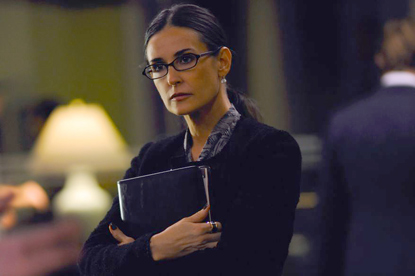
Demi Moore sez, “And what was up with that dog business?”
Second (or, wait, third? no, second, we’re numbering from 0!), I saw the housing bubble as it was happening, and I’m no somebody-who-knows-about-economic-trickeries. I don’t even know who I should put in place of that somebody-who-knows-about-economic-trickeries.
I saw the dot-com bubble, too. I think it really hit home when AOL bought Warner Bros. My dad and I were working on the lot at the time, and we both said, upon hearing the news, “Surely you mean Time-Warner bought AOL, right?” Well, we had a good laugh when it turned out that AOL had, in fact, made the purchase. Keep in mind, this was in the late ’90s when it was announced, and Netscape—the killer of the private online service—had been invented in 1994.
But that required at least some marginal knowledge of things, I suppose. For the housing boom, my “keen insight” was derived from the fact that my house nearly quadrupled in value in 5-10 years, and the houses in my (modest) neighborhood were still being “bought” by people of modest means. Even while having purchased conservatively, I got to the point where I really couldn’t afford my own house. Obviously this couldn’t last.
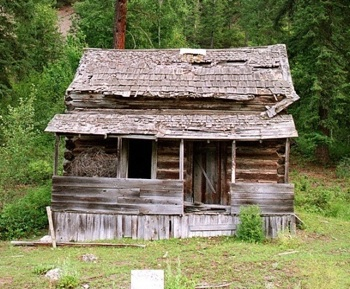
This house went for a MILLION dollars in 2005.
But this was not obvious, apparently, on Wall Street in 2006. Or, maybe it was: This movie takes the tack that it wasn’t, and its protagonists are people trying to bet against the “sure thing”. Some might argue that it was well known, but not acknowledged, sort of like Wile E. Coyote being fine after running off the cliff until he looks down.
We’ll just leave the truth as an exercise for the reader.
Our main players are: Michael Burry (Christian Bale), a guy who’s made lots of money figuring out what everyone else isn’t seeing, and who spearheads the creation of credit default swaps against mortgage failures, which everyone on Wall Street is thrilled to sell him; Mark Baum (Steve Carell), a man haunted by the suicide of his brother and angered by the injustices in the world; and two “kids” Collins and Shipley (Finn Wittrock and Hamish Linklater) who goad survivalist ex-financier Ben Rickert (Brad Pitt) into helping them get in on the action. All narrated by Ryan Gosling as some sort of douchebag.
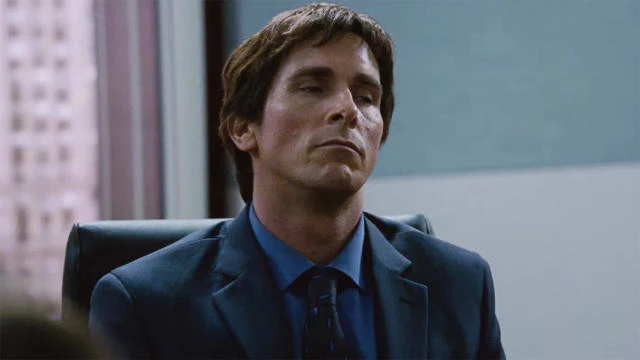
Obvious aesthetic differences aside, Bale really nails Burry.
These guys all get the idea to short the housing market when Wall Street is all gung ho, “real estate will NEVER go down”, and they all put their butts on the line to get in, for various reasons. They all get a degree of validation, and no small sum of money, of course. But there’s more at play here: The premise that they all somehow believed in was that, if they were smart enough and managed to get through all the obstacles set up by the various cronies on Wall Street and government, they, too, could profit by winning at the game.
This was so painfully naive to me, I have to ask myself (a few days later): What’s wrong with me that I’m more cynical than big money financiers? I mean, there are two obvious issues: First is the cynical observation that these barriers exists precisely so we don’t all get to play; second is the more practical observation that, if all the finance companies are up to their ears in bad loans, how are they going to pay out when those loans go bad?
I honestly still don’t know, except it has something to do with lots and lots of taxpayer money.
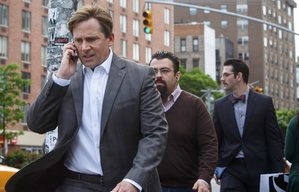
Steve Carrell as Mark Baum, learning to be as cynical as I am.
It’s a fun movie, setting aside the awful corruption it reveals. Actually, not setting that aside for a moment: It likes to aim its righteous anger at Wall Street, but it does show—almost literally—a government watchdog getting into bed with a bankster. Am I being too subtle? A girl working in a Federal Watchdog Agency has sex with someone at a big bank (Chase Morgan?) she’s also trying to get a job from.
This does not stop the movie from suggesting MOAR REGULATION! Of course. We have only one solution to anything. Interestingly enough, the real Mark Burry suggests personal responsibility is a better route. Nutty right-winger.
Anyway, it is a fun movie, having all the necessary elements for suspense, character development, plot twists, a healthy dose of rage-inducing muckraking, and all the actors are just living their roles beautifully. Carrel has the most relatable character, being angry and disappointed and generally doing his Everyman schtick beautifully. There’s also a particular melancholy in Bale’s semi-asperger-y character which is well communicated. And Pitt, while not in a big role, is perfect as the spooky guru who sees the End Times nearer than any of us can be comfortable with.
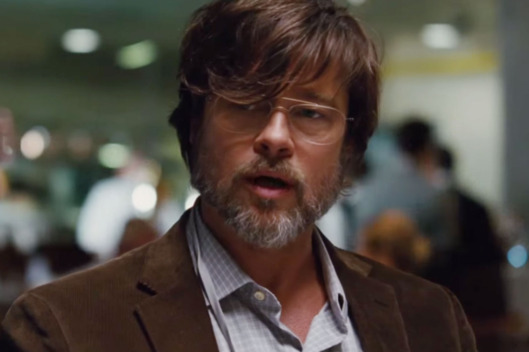
“What did I tell you about the things you own ending up owning you?”
Gosling breaks out of his laconic tough-guy roles to present the perfect picture of smarm. (Perhaps better, even, than Bale’s own turn in American Psycho.) I actually didn’t recognize him without his serious, sorta-crosseyed look he has. He could give Ryan Reynolds a run for his money.
McKay also doesn’t spare the audience: Important financial concepts are explained by Selena Gomez and Anthony Bourdain at the blackjack table and Margot Robbie in a bathtub.
Get it? You weren’t paying attention before. You find this stuff boring. Here’s some glitz to make it go down easier.
The Boy and I were pleasantly surprised. It is one of the few movies of the award season that isn’t, as @JulesLaLaLand puts it, dour.

In closing, Margot Robbie in a bathtub because maybe I share the same opinion as Adam Mackay.
